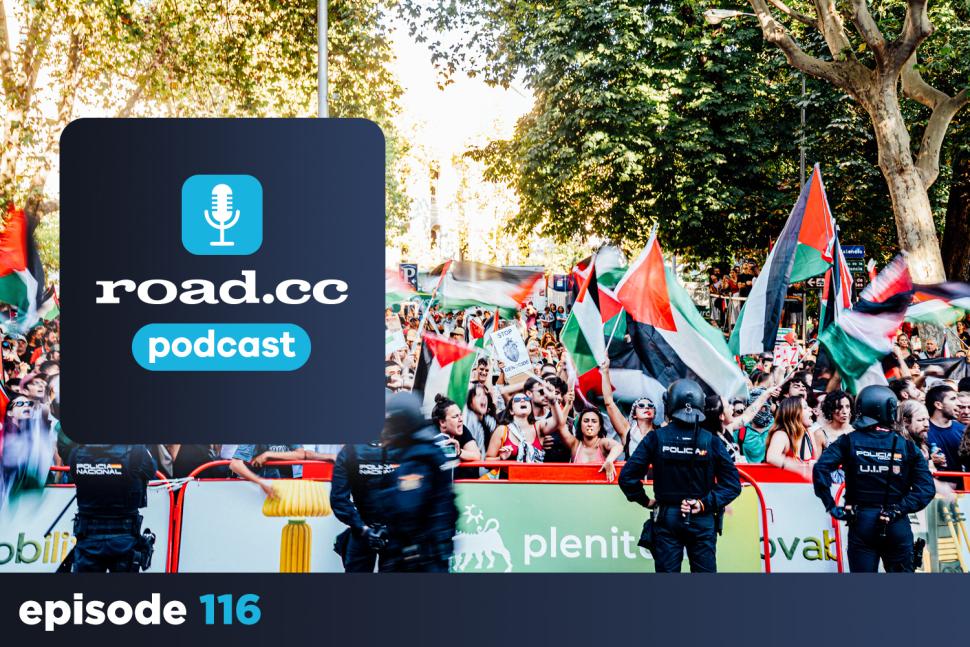Apart from the dreaded ‘P’ word (Pogačar, in case you’re scratching your head), two terms have defined this most tumultuous of cycling season, casting a long shadow over the sport in the process: sportswashing and protests.
And, for the most part, the glare of the sportswashing spotlight has been fixed intently on Israel-Premier Tech, the WorldTour squad which has been the subject of intense protests concerning its links with the state of Israel amid the devastation in Gaza.
These protests against the team, which while not officially state-owned was established with the aim of promoting a ‘modern vision’ of Israel, and its participation in cycling’s biggest races took place at the Giro d’Italia and Tour de France, and reached fever pitch at last month’s Vuelta a España.
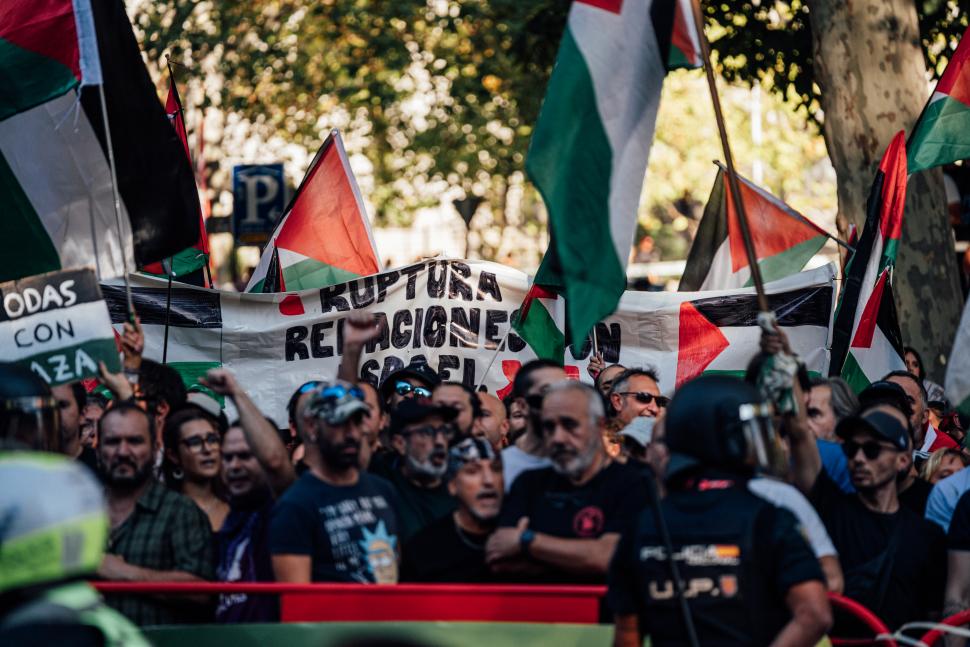 Pro-Palestine protests in Madrid, 2025 Vuelta (credit: Zac Williams/SWpix.com)
Pro-Palestine protests in Madrid, 2025 Vuelta (credit: Zac Williams/SWpix.com)
The Spanish grand tour saw activists run onto the course and into the peloton, roads blocked, clashes between police and protesters, and stage finishes abruptly cancelled, including on the final day in Madrid, where several mass protests spilled over into street violence.
The tension on the roads of Spain and elsewhere has raised concerns about next year’s Tour de France Grand Départ in Barcelona, while also prompting Israel-Premier Tech withdraw from the series of autumn one-day races in Italy due to security fears, while also changing their kit to avoid reference to Israel.
Meanwhile, former riders Jakob Fuglsang and Alesandro De Marchi have spoken out about their unease at riding in IPT colours, and the team is currently embroiled in a legal battle with Derek Gee after the Canadian rider ripped up his contract citing concerns about safety and his own personal beliefs.
And earlier this week, just days before a ceasefire and hostage deal was agreed to tentatively end the fighting in Gaza, things also came to a head in the sporting world, with Israel-Premier Tech announcing that it will change its name and identity from the start of the 2026 season.
That means the team will no longer operate with the Israel name or with Israeli nationality, while owner Sylvan Adams – a vocal supporter of Israel’s actions in Gaza – will take a step back and no longer speak on behalf of the team.
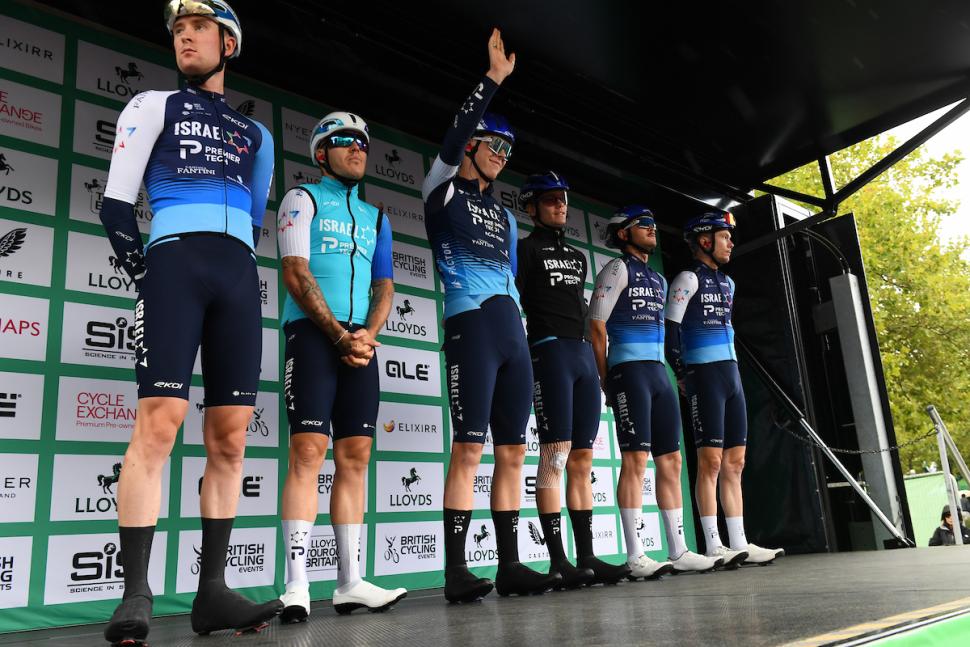 Israel-Premier Tech 2025 Tour of Britain (credit: SWpix.com/Simon Wilkinson)
Israel-Premier Tech 2025 Tour of Britain (credit: SWpix.com/Simon Wilkinson)
And while that decision – as well as those taken on the international stage this week – could forge a path for cycling to move on from the turmoil that gripped the Vuelta, the protests which marred the 2025 road season could have longer lasting implications.
And one those implications, reckons former UCI president Brian Cookson, involves the future of cycling team sponsorship, and the role nation states currently play in backing and attaching their name to high-profile cycling teams.
“I think if you leave the politics side of it, if you associate your team strongly with a product or a nation or political movement or anything really, you shouldn’t be too surprised if the actions of that nation, product, whatever, are bringing the team into disrepute in whatever way, whether that’s justified or not,” Cookson told the road.cc Podcast.
“So the upside of sponsoring any sport is that you get some good vibes out of it, you get a good feeling. But if you get it wrong, if something is wrong in what the perception of your sponsor is, then that’s the downside. You’re going to face that as well.”
.jpg) Brian Cookson at 2013 Junior World Track Championships (credit: Brian Cookson Images)
Brian Cookson at 2013 Junior World Track Championships (credit: Brian Cookson Images)
Cookson, who led the UCI between 2013 and 2017 after serving as British Cycling’s president for 16 years, was at the helm of the sport’s world governing body when Bahrain and the UAE first entered the sport, backing what are now the Bahrain-Victorious and UAE Team Emirates squads.
The decision to sign off on the two states’ arrival in cycling is one, in retrospect, he now regrets (though Cookson acknowledges that, at that moment, the issue of sportswashing played a distant second fiddle to the ongoing battle against doping in cycling).
“Maybe we shouldn’t have a country sponsoring a professional team,” he says now. “And I wonder if one of the simple things that UCI might do to remedy that, and maybe it’s not that simple actually, is just to change the rules to say you cannot have a nation state as the name, lead, or sponsor of a team.
“You can have something like a national airline, or a national industry, or even a sovereign wealth fund or something like that. But you can’t just have the name of a nation.
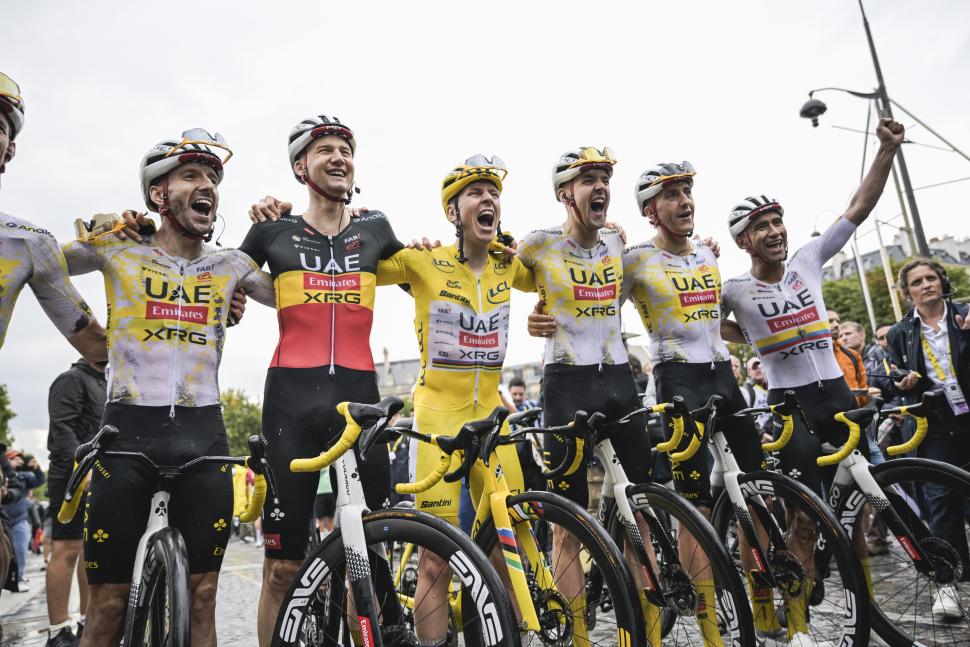 Tadej Pogačar and UAE Team Emirates celebrate winning the 2025 Tour de France (credit: ASO/Charly Lopez)
Tadej Pogačar and UAE Team Emirates celebrate winning the 2025 Tour de France (credit: ASO/Charly Lopez)
“Now, that’s not just going to affect Israel too, if that happened, it’s going to affect UAE. It’s going to affect Bahrain, for instance, arguably Astana, and there are other teams that have got associations with sponsors that some people don’t like as well.
“But I think that the naming of a professional team after a nation state is probably something that the time has passed where that’s been a good idea. But it would certainly be something that I would want to consider if I was still UCI president.”
One of the other consequences of the controversy surrounding Israel-Premier Tech this year has been the apparent success of the pro-Palestine demonstrations in bringing a huge race like the Vuelta to a halt, a result Cookson argues of years of neglect when it comes to safety measures.
“For many, many years, decades, there have been protests of one sort or another at bike races because it is an easy target in that sense,” he points out.
“And I think we’ve not done enough to make it secure and safe as a sport, and we are now seeing the downside of that. I’ve felt for many years now that race organisers and so on are going to have to do something more in terms of security.”
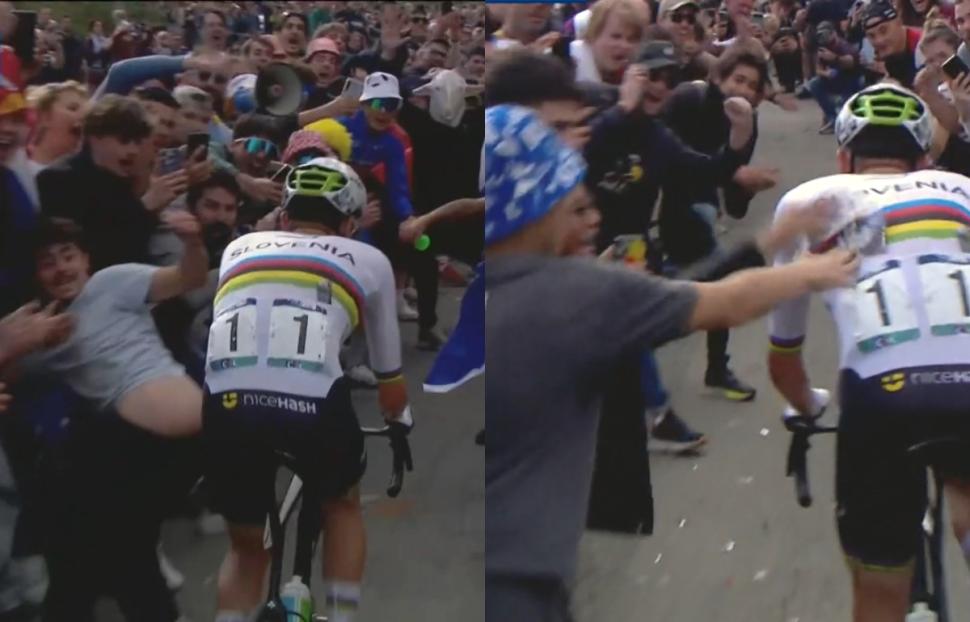 Spectators put stickers on Tadej Pogačar’s back during European Championships (credit: TNT Sports)
Spectators put stickers on Tadej Pogačar’s back during European Championships (credit: TNT Sports)
Criticising the behaviour of non-protesting spectators at the recent European championships, which saw rowdy ‘fans’ touch the riders and even attempt to hit Tadej Pogačar during his solo ride to victory, Cookson believes the lack of crowd control is an “accident waiting to happen”, and one that has been magnified by the recent proliferation of successful protests.
“We’re ambivalent about so many things in cycling that – look at all those people, isn’t it great that they’re all so enthusiastic?” he says.
“And well, it sort of is, but on the other hand, it’s a disaster waiting to happen. If you talk to any DS or any commissaire or whatever, they will say, it’s just a miracle it doesn’t happen much more often that somebody comes into contact with a race vehicle or something like that.
“And it is clearly a disaster waiting to happen. We can see signs of that in a different way now with these political protests that are in themselves an acceleration, an increase in the degree of danger, in the degree of impact.
“So we’ve got to sort of deal with some of these ambivalences, some of these contradictions on safety. We go on about, oh, look at that, what a great descender he is. Then somebody comes off and has an awful accident and injury or death – and it’s, oh, cycling is so dangerous.
“The sport is full of those kind of contradictions, which we can only do so much with. The whole point of road racing is that it does take place in a live human, natural environment.
“But I think we’ve got to do more, though, to manage that scenario, we’ve got to do more in terms of crowd control. The crowds themselves have got to start behaving themselves a lot better.”
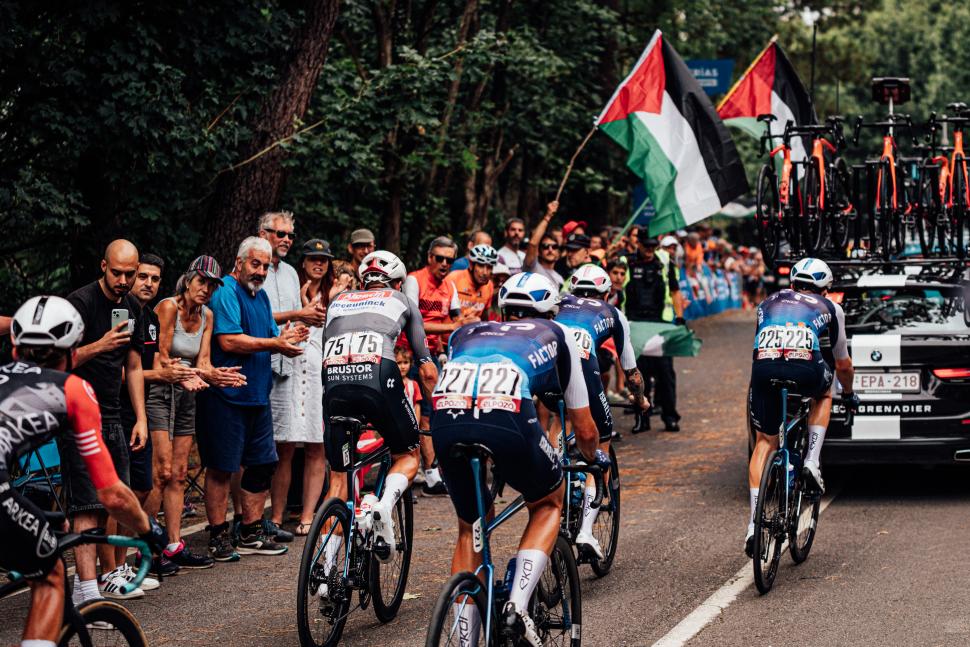 Israel-Premier Tech ride past Palestine flags, stage 11, 2025 Vuelta (credit: Zac Williams/SWpix.com)
Israel-Premier Tech ride past Palestine flags, stage 11, 2025 Vuelta (credit: Zac Williams/SWpix.com)
Following the protests at the Vuelta, the head of the CPA riders’ union, Adam Hansen, argued that immediately cancelling stages when mass demonstrations take place would play a role in disincentivising protesters looking to take advantage of the open-air platform bike races provide.
“Protesters should have the platform taken away from them. If they have no platform, they won’t go to a race,” Hansen told the BBC.
“Cancelling would have shown them there’s no point in coming to bike races because we turned the TV off. Yes, it’s a huge deal… but we have to make a small sacrifice today for the long-term future of cycling.”
However, according to Cookson, the former Lotto rider’s stance amounts to a capitulation.
“I’ve got great respect for Adam Hansen, but I think he’s wrong on that one,” he says. “I think that sounds more like capitulation than anything else.
“I think I know where he’s coming from. I understand it completely. The safety of the riders is absolutely his concern, and so it should be.
“But I think you’ve also got to think about the sponsors, the stage towns, and the people on the route who don’t have those kind of views.
“I think the difference here has been the strength of feeling about the particular issue that has hit so hard with so many people, a lot of people felt very, very strongly about it.
“Let’s keep our fingers crossed that this particular dispute in Gaza looks like being resolved – I think that will substantially take the heat out of the situation.
“And then I think we do still need to do more in terms of ensuring security on the road of live road events, especially where there is television coverage. some of the race organisers need to do more.
“It’s not a popular view, I don’t suppose, down in the offices in Paris, but I do think that if you’re going to put on a massive spectacle that involves huge numbers of cyclists, who are paid a lot of money to compete, huge numbers of vehicles, huge numbers of volunteers and workers and sponsors and so on in a cavalcade that travels around the country and other countries, you need to do more.
“What’s been made clear by the last few weeks has been the need to absolutely get more on top of that whole issue and ensure that you’ve got procedures in place that will deal with those dangers to all concerned in a more effective way than we’ve had at the past. And that’s probably much easier to say than it is to do.”
Cookson is appearing on the road.cc Podcast shortly after returning from the road world championships in Rwanda. The first ever worlds on the continent of Africa attracted praise for its hospitality, organisation, and vibrant, passionate crowds.
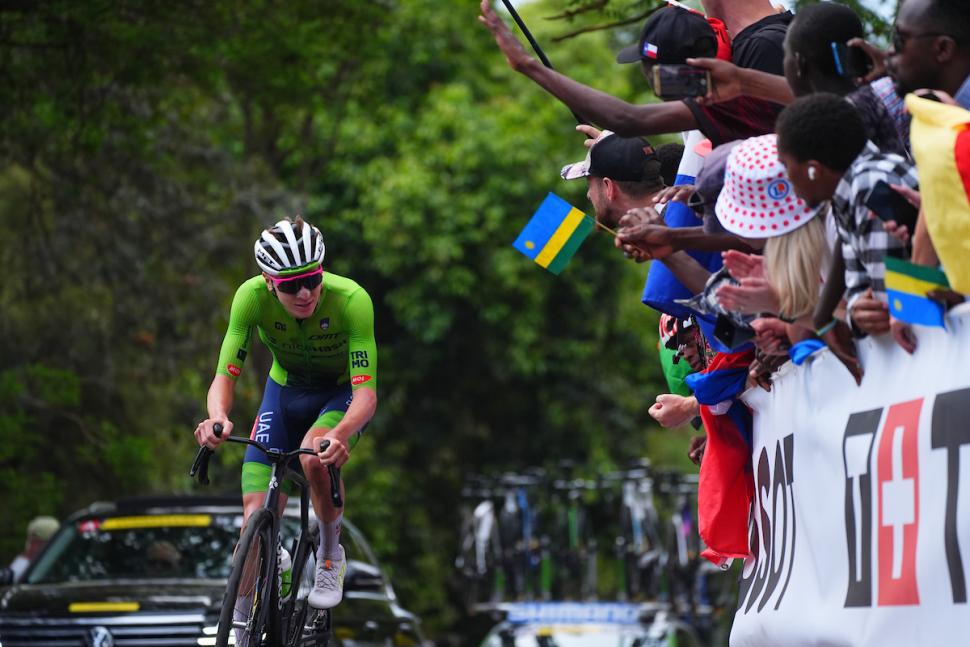 Tadej Pogačar wins 2025 World Championships (credit: Zac Williams/SWpix.com)
Tadej Pogačar wins 2025 World Championships (credit: Zac Williams/SWpix.com)
However, it also saw the UCI accused of engaging in sportswashing by taking its flagship event to Rwanda, whose authoritarian government, led by Paul Kagame, has been linked to several severe huma rights abuses, while using sport as a means of burnishing its image on the world stage.
“I think there are a number of different ways of looking at all of these issues of sportswashing and so on,” Cookson says, reflecting on cycling’s relationship with the world around it in general.
“I mean, is it better to have contact with some of those regimes than not? Or is it better to ignore them and penalise them and pretend that they have no place in the world of sport and so on?
“Is sport a force for good? Or for battering people into submission in terms of political stances? I think we’re in a scenario in a number of places where sport is being used for reputation improving rather. But sportswashing implies that it’s a one-way process and you do something bad and then you do something good and it discounts all of the bad things that happened before.
“And I don’t think that is actually the case. I think what something like Rwanda world cycling championships has done is open up the possibility of a newer future, a better future for relations in that area, and relations between that country and the rest of the world.
“I think the problem comes that there are actually so few parts of the world that are absolutely blameless in terms of human rights and democratic procedures and independent judiciary and all those sorts of things.
“Maybe it’s a little bit naive and there are certain regimes in certain parts of the world that I would personally not want to be involved with.
“But I think it’s a real danger if we say, you know what, we’re alright, we’re all perfect. And those other people over there, they’re bad people, they’re doing bad things.
“I’m kind of optimistic enough to hope that we can use sport in a positive way.”
Elsewhere in this week’s podcast, we also discuss the state of professional cycling in 2025, how the sport has moved on from the doping era Cookson saw first-hand as UCI president, and where things are currently going right (and wrong) for cycling in the UK.
The road.cc Podcast is available on Apple Podcasts, Spotify, and Amazon Music, and if you have an Alexa you can just tell it to play the road.cc Podcast. It’s also embedded further up the page, so you can just press play.

